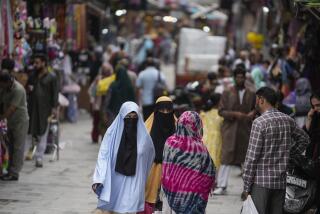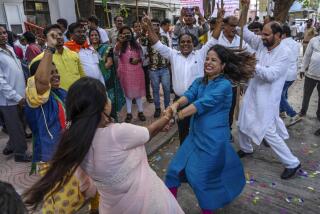Ruling Party’s Long Run Is Over in Kashmir
- Share via
LAR VILLAGE, India — The political party that ruled Jammu and Kashmir state for the last half a century was humiliated at the polls Thursday, sparking calls for a new style in governing the region that has been racked by a Muslim insurgency.
No party earned a majority in the 87-seat local legislature, paving the way for a coalition to replace the old guard. Kashmiris expressed hope that fresh faces could bring an era of openness and assist talks between nuclear powers India and Pakistan, who have fought two wars over the disputed territory.
Particularly jarring for the ruling National Conference party--which has been criticized as arrogant, corrupt and inept--was the defeat of Omar Abdullah, its leader, son of the current chief minister and grandson of the party’s founder.
A dozen cars, trucks and buses were packed with supporters--many hanging off the roofs--who cheered and celebrated the downfall of a political dynasty and the victory by Qazi Mohammed Afzal of the People’s Democratic Party, or PDP.
“I’m ecstatic,” said Ali Mohammed Rather, 52, a Lar Village resident. “We’re really happy to be the ones to cut off the head of the National Conference. We’ll be celebrating until at least tomorrow night.”
The closely watched state election was a drawn-out process involving about 90,000 security and polling officials, four voting rounds and more than 800 deaths.
The Indian government called the elections a victory for democracy, and many Kashmiris said polling was much cleaner than in 1996 and 1987. Analysts said the relatively high 44% turnout, despite gunfire and harassment, was driven by anti-National Conference sentiment.
“This is the first bit of good news in Kashmir in a long time,” said Mohammed Ayub, a 26-year-old government worker. “I feel like my vote finally means something.”
Pakistan has condemned the election as a sham and called instead for a U.N. plebiscite on whether Kashmir should join Pakistan or become independent.
Noor Ahmed Baba, a political scientist with the University of Kashmir, said Kashmiris voted for local change and were not endorsing control by either India or Pakistan. “Many people in Kashmir have been cynical of both sides,” he said.
Heartening to some were reports that several independent candidates were secretly representing Islamic separatist groups, suggesting a timid early step toward the ballot over the bullet.
The anti-incumbent vote mirrors changes seen nationwide over the last decade as state voters have become increasingly impatient with politics as usual.
The lack of any clear winner Thursday quickly fueled speculation about a future coalition--and the likely promises, money and dirty deals under discussion behind closed doors.
In unofficial results, the National Conference secured 28 seats--compared with the 57 it had--the rival Congress Party won 20 and the local opposition PDP won 16. The remaining 23 went to smaller parties.
The PDP has called for rolling back draconian laws that give security forces in Kashmir broad authority to detain suspects without charges.
Samiena Begun, 65, of Lar Village said her son was severely beaten in 1999 by security forces after strongly petitioning top state officials for a job. Others tell similar stories, which could not be verified.
But Pervez Imroz, president of the Assn. of Parents of Disappeared Persons, a civic group based in Kashmir’s summer capital, Srinagar, said he’s not optimistic. Many alleged abuses by security forces aren’t subject to state control, he said.
An estimated 6,000 Kashmiris have vanished--the state has acknowledged 3,155--at the hands of security forces, Imroz said.
“If armed forces can continue to act with impunity because they’re seen as fighting a patriotic war, the disappearances won’t stop,” he said. “I hope I’m wrong, but the human rights abuses will likely continue.”
Much of the drama Thursday centered around National Conference chief Abdullah, 32, and why his party failed so badly. About noon, shortly after he entered the vote-counting center to watch his presumed victory, votes started coming in the other way. As the media hounded him for a comment, his face dropped.
“The heavens fell on my head,” he said after regaining his composure, adding that the people’s will was clear and his party would not try to join the coalition.
A major handicap for Abdullah was his relatively low profile and outsider reputation. Despite being part of such a powerful family, the articulate scion isn’t fluent in the Kashmiri language and has spent most of his time in national politics in New Delhi. Born in Britain to a British mother, he was educated in Scotland and Srinagar.
Around Lar Village, residents chanted, hugged and took part in traditional folk dances to celebrate the National Conference trouncing. A small courtyard in the winning candidate’s house became so jammed that people climbed onto the roof and mobbed the street outside to be part of the historic moment. Fireworks caused heads to turn in a region that has grown wary of gunfire.
Inside, Abdul Rachid, the winning candidate’s brother, held court as a string of well-wishers entered the front room to congratulate him and sip tea after stopping to remove their shoes outside.
“Let us begin anew, toward peace and friendship,” he said. “With a fair election, India has taken a step to rebuild confidence in Kashmir. But this is only the first step, and there are many more ahead.”
More to Read
Sign up for Essential California
The most important California stories and recommendations in your inbox every morning.
You may occasionally receive promotional content from the Los Angeles Times.













